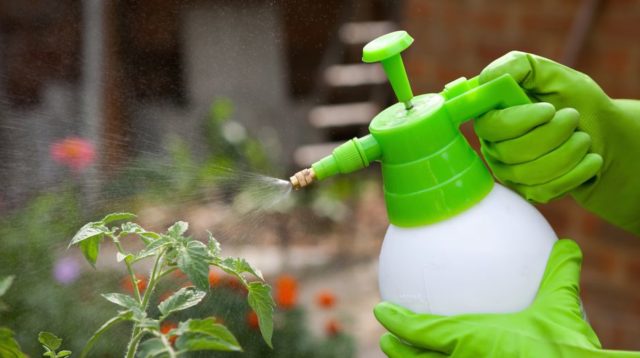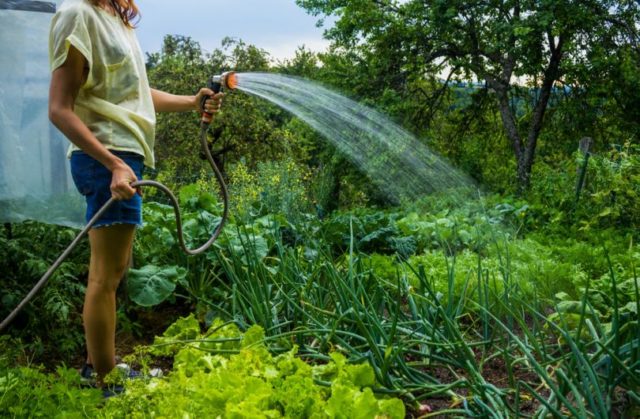Content
- 1 Why is onion peel useful in the garden
- 2 Pros of using onion peels in the garden
- 3 What flowers and plants can be fed with onion peel
- 4 How to collect onion husks for the garden
- 5 How to use onion peels for the garden
- 6 Rules for the use of onion peels in the garden and garden
- 7 How to use onion husks for indoor plants and flowers
- 8 Onion peel treatment for pests and diseases
- 9 How to use onion husks for storing root crops
- 10 What plants can not be fed with onion peel
- 11 Storage rules for raw materials
- 12 Conclusion
Onion hulls are very popular as a plant fertilizer. It not only improves the ability of crops to bear fruit, but also protects them from diseases and harmful insects.
Why is onion peel useful in the garden
Gardeners use onion skins for several purposes. With its help, the soil is treated, spraying is carried out, and infusions are added to the water for irrigation. In all cases, the agent has a strengthening, disinfecting and stimulating effect.
Composition
In the composition of onion scales, there are many useful components. Among the main ones:
- quercetin and rutin;
- phytoncides;
- vitamin PP;
- vitamin B1;
- carotenoids;
- vitamin C.
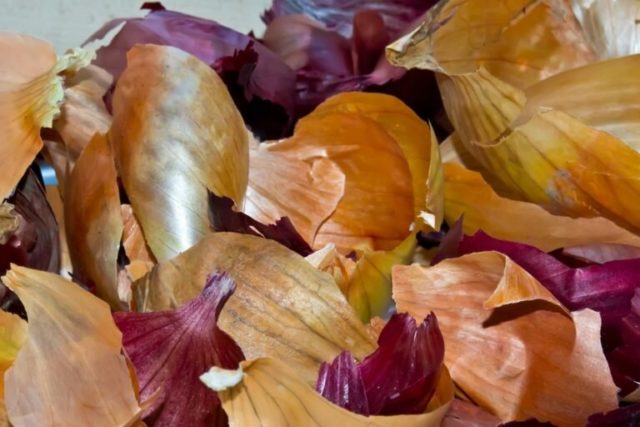
The flakes contain vitamins, rutin and quercetin
Also, the raw materials contain useful minerals - potassium, iron and calcium.
Why onion peels are useful for plants and soil
Fertilizing the garden with husks helps:
- improve the composition of the soil;
- scare away or destroy pests;
- strengthen plant roots and accelerate development;
- to increase the resistance of crops to the effects of cold weather.
Purposes and methods of using onion peels in the garden
On the site, natural fertilizer is used:
- to saturate the soil with vitamins and microelements;
- to protect against fungal diseases and insects;
- to restore the vitality of plants affected by frost;
- for long-term storage of vegetables.
The methods of application are as follows:
- spraying plantings over the leaves;
Onion infusions do not burn the leaves and are safe to spray
- adding broths and infusions to water for irrigation.
When watering with onion broths, valuable substances quickly get to the roots
The husk is also used to mulch the soil in the beds and under the trees. It not only serves as a fertilizer, but also prevents moisture evaporation.
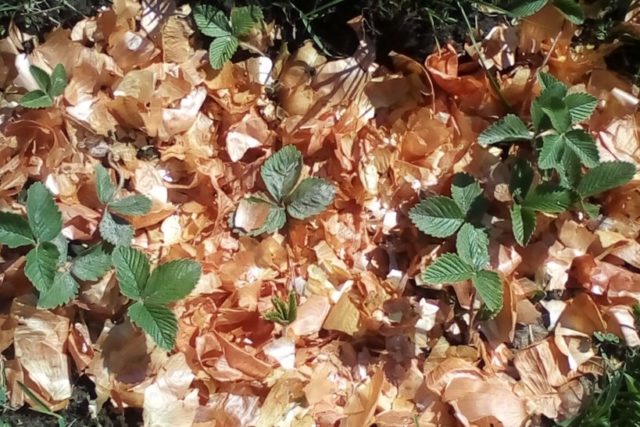
Onion husks - one of the options for mulching plantings
Pros of using onion peels in the garden
The use of onion peels in the garden has several advantages over chemicals. Namely:
- environmental safety, plants do not accumulate harmful substances;
- profitability - you don't need to buy raw materials, you can get it from your own garden;
- ease of use, infusions and decoctions are easy to prepare.
Processing with onion scales can be carried out at any time during the season.
What flowers and plants can be fed with onion peel
Onion peel as a fertilizer for the garden is suitable for almost any plant. Top dressing can be carried out for tomatoes and potatoes, peppers and cucumbers, squash and pumpkin, strawberries and berry bushes. Onion peels are safe for garden flowers.
How to collect onion husks for the garden
Usually, raw materials are harvested in the fall before sowing a vegetable before winter. The bulbs are sorted out and scales are removed from them.
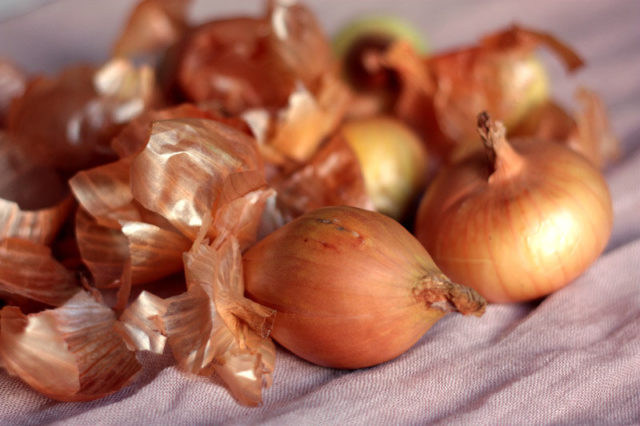
Peelings from yellow and red onions are suitable for fertilization.
After collecting the husks, they are laid out to dry in a warm place without drafts for several days. Then the raw material is poured into a cotton bag and stored in a cool place until spring.
How to use onion peels for the garden
Basically, on the basis of onion peelings, infusions and decoctions are made. There are several recipes for making fertilizers.
How to prepare an infusion of onion peel for a vegetable garden
A quick infusion of onion peels for use in the garden is done as follows:
- an ordinary 10 liter bucket is tightly packed with dry cleanings;
- fill up to the top with water about 70 ° C;
- cover and leave for 12 hours.
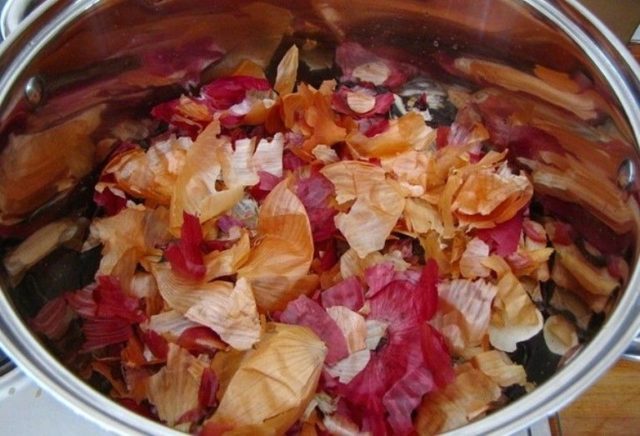
It is very simple to prepare the infusion - the bucket is filled with husks and poured to the top with water
The finished infusion is filtered and immediately used to fertilize the plantings.
Infusion of onion peels for the vegetable garden by the cold method
You can fill in the cleaning with cool water. The cooking process will take more time - 2 days, but the finished infusion will retain maximum benefits. It will not work for urgent spraying, but it can be used for routine fertilization.
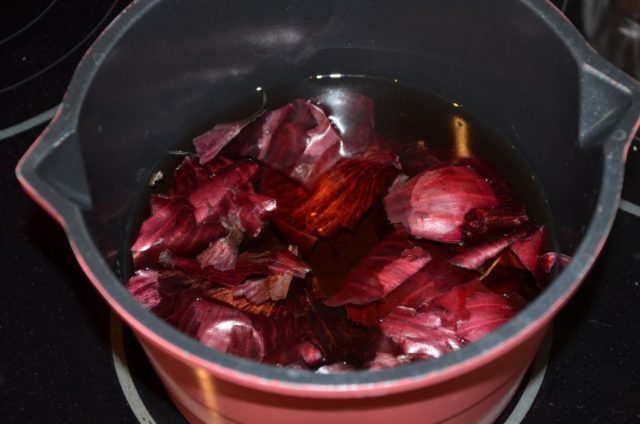
You can insist on cleaning in cold water, while more valuable substances are retained
How to make an infusion of onion peel for plants in boiling water
Usually, onion peel tincture for plants is poured with hot water at 70-80 ° C. But for cooking, you can also use boiling water - to keep the cleaning in a bucket under the lid in this case is required throughout the day.
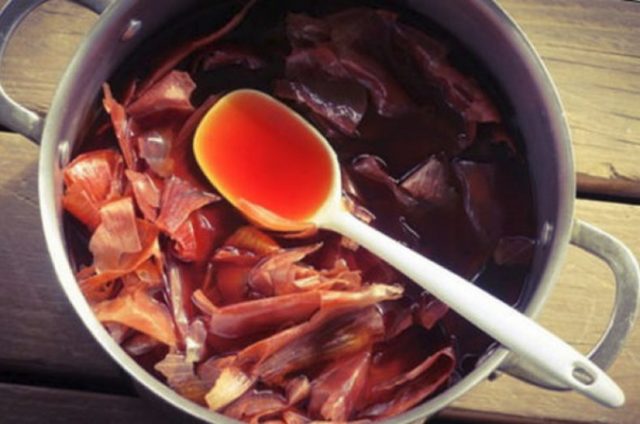
When insisted in boiling water, onion cleaning gives off a maximum of valuable substances
The finished product is filtered, diluted with clean water 1 to 5 and used for watering the soil.
Onion peel decoction recipes for plants
In addition to infusions, decoctions from husks are used to fertilize the soil. There are several popular cooking recipes:
- Concentrated remedy for treatment. A large metal bucket is tightly filled with scales, tamped and filled with hot water. Then boil for 2 minutes, remove from heat and leave for 2 days. Before use, the broth is diluted in a ratio of 1 to 5.
- Means for spraying and watering. Place 2 handfuls of cleanings in 10 liters of water and boil for several minutes. After insisting for 4 hours, use it immediately, without straining or diluting.
- Fertilizer for garden and indoor flowers. A handful of dry husks are immersed in 1.5 liters of water and boiled for about 5 minutes, and then kept under the lid for 2 hours.
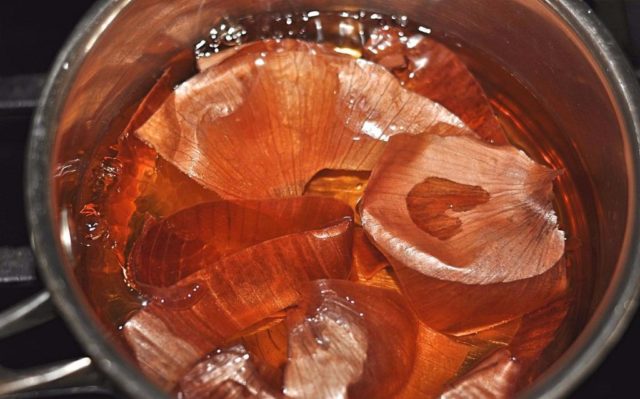
Fertilizer husks can be boiled and used almost immediately after cooling.
In the process of processing, some of the nutrients in the flakes are destroyed. But the remaining vitamins and minerals are transferred to the water in high concentration.
As mulch
For mulching, you can use both the cake left after the preparation of infusions, and fresh cleaning. Raw materials are scattered over the beds or under the bushes with a layer of about 5 cm.
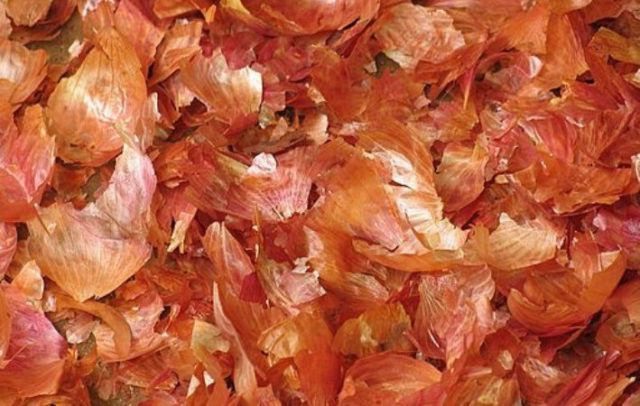
When mulching a vegetable garden, the husk must be moistened so that it is not scattered by the wind.
Rules for the use of onion peels in the garden and garden
You can use onion peels to fertilize almost any plant. But when caring for specific crops, you need to know their requirements.
Onion husks for feeding seedlings
Vegetable crops need fertilization already in the early stages of growth. For young seedlings in a greenhouse or in boxes on the windowsill, prepare the following infusion:
- a handful of husks are tightly placed in a jar;
- pour boiling water in a volume of a liter;
- leave to infuse for a day.
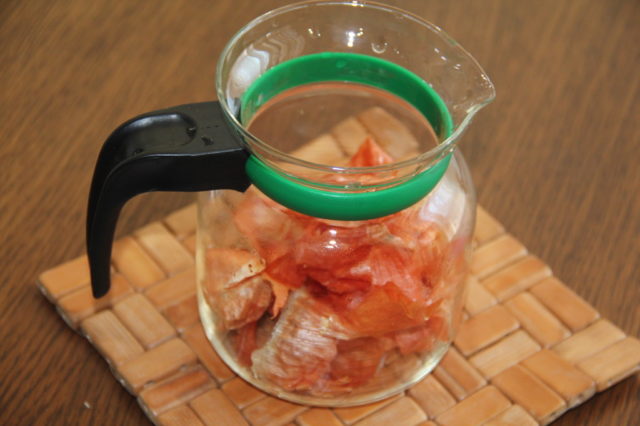
For seedlings, onion husks are brewed in just a liter of water
Onion husks for seedlings are diluted in a ratio of 1 to 3 with warm clean water and used for watering at the root.
For vegetable crops
Fertilization with onion skins is beneficial for actively developing crops at any stage. Healthy plantings can be sprayed only 2-3 times per season, weakened plants are allowed to be treated weekly.
For tomatoes and cucumbers
Watering and spraying cucumbers in the greenhouse and soil is recommended every week to protect against fungi. You can use any infusion on the husk.
Tomatoes are watered with onion fertilizer from fungi throughout the entire cultivation - from seedlings to harvesting. You can use a standard infusion, the consumption per bush is 1 liter, and for tomatoes it is the root method of feeding that is preferable.
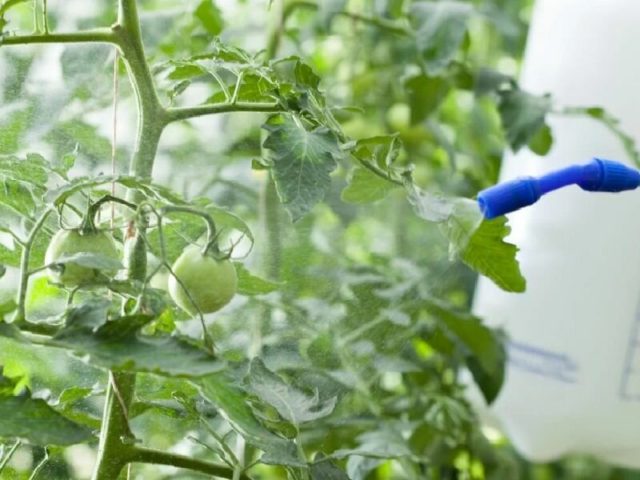
Tomatoes can be watered with infusions of onion scales throughout the season.
Adding onion husks when planting potatoes
Onion peels help protect potatoes from the dangerous wireworm pest. They are usually used like this - in the prepared holes at the planting stage, they close up a large handful of husks.
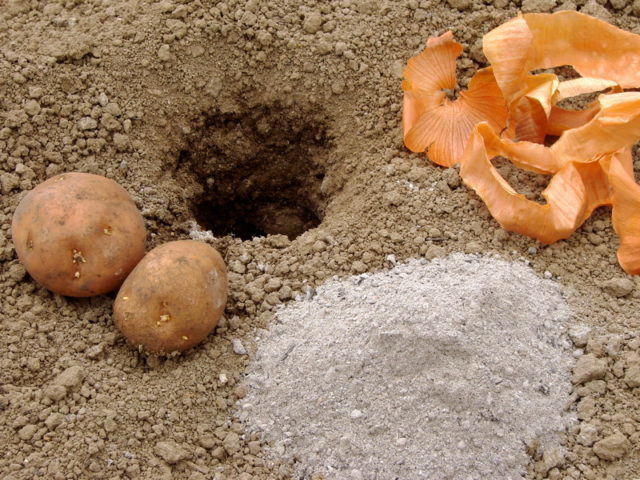
Peelings from onions are placed in the holes even before planting potatoes - this scares off pests
For pumpkin
For pumpkin fertilization, a concentrated decoction of the husk, diluted with clean water, is used. They do it like this:
- a glass of cleanings is poured with water, you need to take 2 liters;
- boil and immediately turn off;
- insist under the lid for 12 hours.
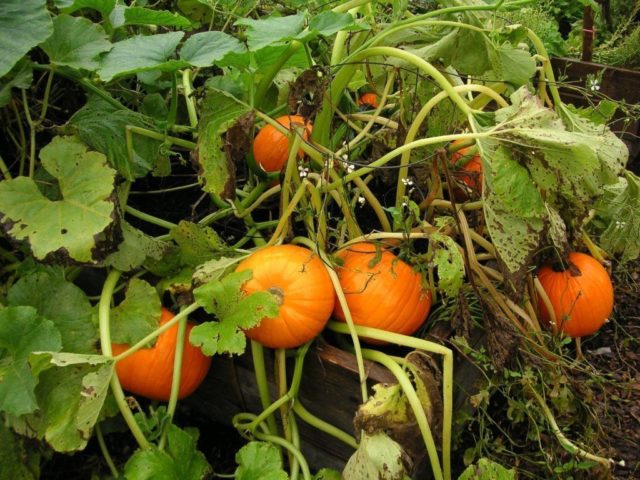
Strong onion infusion can be used to process pumpkin to protect against diseases and increase yields
Fresh fertilizer is diluted with a bucket of clean water and the garden is treated before planting the pumpkin. During the season, the vegetable crop is watered or sprayed with the same infusion every 2 weeks.
For radish
You can use onion peels in the garden to increase the juiciness of the radish. For processing, take the following infusion:
- a liter can of dry raw materials in a bucket is poured into 8 liters of boiling water;
- cover with a lid and leave for a day;
- the finished product is diluted with water 1 to 5.
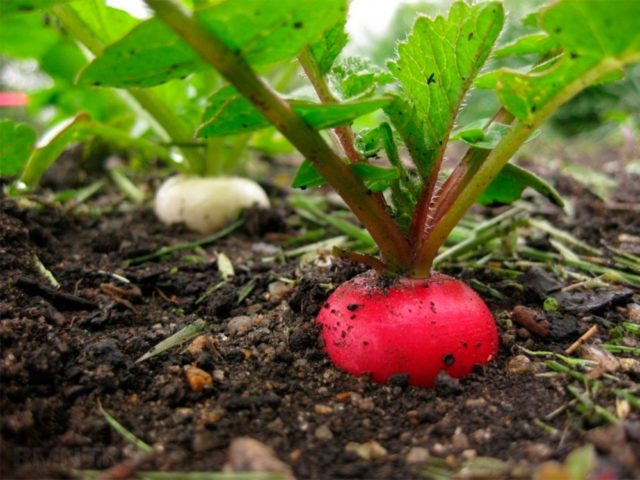
Onion hulls help prevent radish cracking and disease
The resulting infusion is used to process radish immediately after planting, and then spray the culture twice a month during growth.
For fruit and berry crops
You can use the husk for processing strawberries, garden strawberries, gooseberries, currants and other crops. Fertilizer improves yields and makes the berries sweeter, and also helps to get rid of pests.
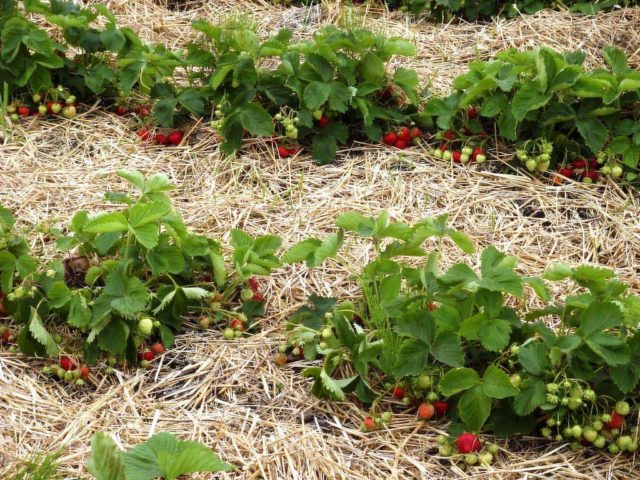
You can process onion infusions not only strawberries, but also any fruit crops
A standard treatment agent is taken, the bucket is filled with scales and poured with hot water, after which it is infused for 12 hours. For the purpose of fertilization and prevention, fruit and berry crops are sprayed before and after flowering; weekly watering at the root is used to combat insects.
For garden flowers
The benefits of onion husks for plants extend, including to garden flowers. Fertilizer is applied in the same way as for fruit and berry crops, prepared in accordance with the selected recipe and diluted with clean water to reduce the concentration. Preventive spraying is carried out when pouring the buds and during flowering.

Onion peel and its infusions are an effective means for improving flowering
To protect against fungi, you can water garden flowers with onion infusion at the root. When infested with pests, spraying is usually used.
How to use onion husks for indoor plants and flowers
Houseplants often suffer from a lack of nutrients in cramped pots. Fertilization with natural solutions supplies them with vitamins and minerals through the leaves and roots, strengthens the immunity of crops.
Is it possible to water flowers with onion peels
Infusions and decoctions on onion scales are suitable for root fertilization of indoor plants. If you follow the correct dosages, this will not cause harm.
Watering flowers with a decoction of onion peels
The broth has a high concentration of nutrients, and it is usually used if the houseplant begins to turn yellow and wither. Prepare the product like this - 1 glass of cleanings is boiled in a pot of water for 5 minutes, and then cooled and root fertilization is carried out.
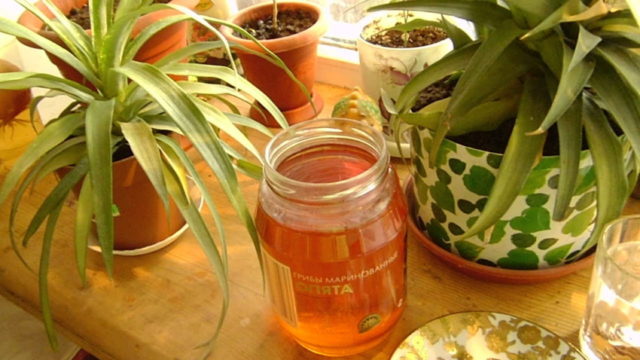
Indoor plants can be watered with onion broth with a pronounced lack of minerals
With a lack of nutrients in the soil or with fungi, the remedy helps quickly. The result becomes noticeable after the first application; plants are fed with onion peels once a week.
Watering flowers with infusion of onion peels
For the purpose of conventional preventive feeding, fertilizer with a low concentration is used. To prepare it, it is enough to remove dry scales from a pair of large golden onions and pour it with a liter of boiling water, and then insist for 3 days.
With a ready-made product, soil in pots is poured. Usually, after 2 weeks, the plants begin to actively grow.
What is the use of watering onion peel for violets
Beautiful violets are sensitive to nutrient deficiencies. If the flower has stopped growing, turns yellow and does not bloom, you can treat it with onion infusion. The fertilizer will deliver vitamins to the plant tissues, increase immunity and improve flowering.
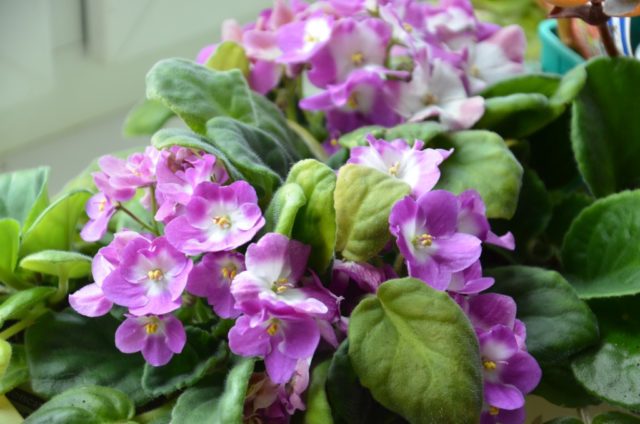
It is recommended to fertilize violets with onion peels once every 2 months.
A glass of dry cleaning must be poured with 2 liters of water and boiled for half an hour over low heat, and then insisted for 6 hours under the lid. Watering is carried out with a ready-made product, it is important to carry it out in the morning or in the evening, at a stable temperature in the room and not earlier than a month after transferring to a new pot. Water should not fall on the velvety leaves - this is harmful for violets.
Onion peel treatment for pests and diseases
An important area of application of onion peels for a vegetable garden or garden is the fight against fungal diseases and pests. For treatments, 2 liters of a concentrated broth of five days' aging, topped up with a bucket of fresh water, are used.
Onion peel from aphids
The active substances in the onion infusion help to cope even with large aphid colonies. Infected plantings are generously sprayed from a spray bottle on a cloudy day, remembering to process the underside of the leaf plates.
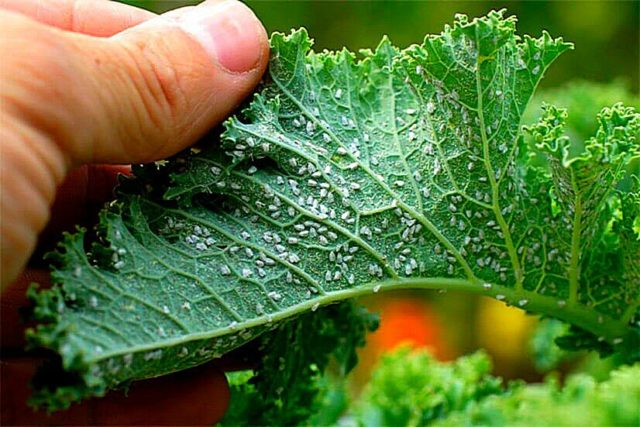
Spraying with infusions of onion scales helps get rid of aphids
The treatments can be repeated every week. But usually it is possible to eliminate aphids after three uses of the fertilizer.
Wireworm Onion Husk
The pest feeds on underground parts of garden crops and causes particular harm to potatoes. To combat the wireworm, dry onion peelings are embedded directly into the beds when planting tubers.
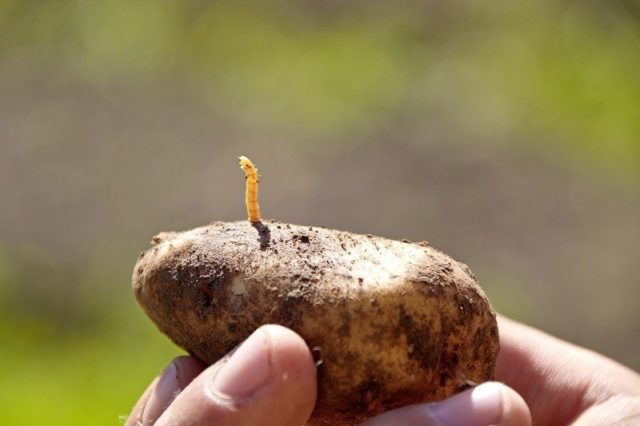
For the prevention of wireworm, onion cleaning is usually embedded in the soil in the spring.
If the pest does appear, then the soil can be spilled once a week with a concentrated broth. But usually adding husks to the wells will protect the culture.
Against blackleg and bacteriosis
Fungal diseases most often affect seedlings and adult plants with waterlogging and with sudden changes in temperature.To prevent the development of ailments or cope with symptoms, plantings are sprayed with any of the fertilizers on onion peels once a week in spring and in rainy summer conditions.
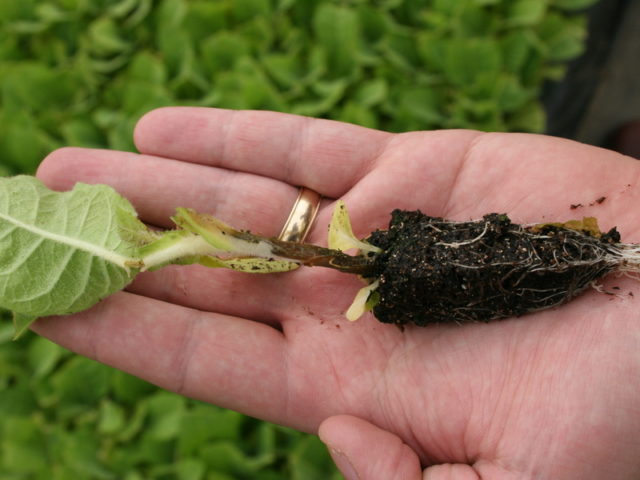
In wet weather, you can spray the garden with infusion of onion peels to prevent black leg
Onion remedies for bacteriosis and black leg are rarely applied under the root. Usually, with these ailments, the soil is already very waterlogged.
Against bacterial cancer
The disease leads to the appearance of tumors and wounds on the rhizomes and aerial parts of plants.
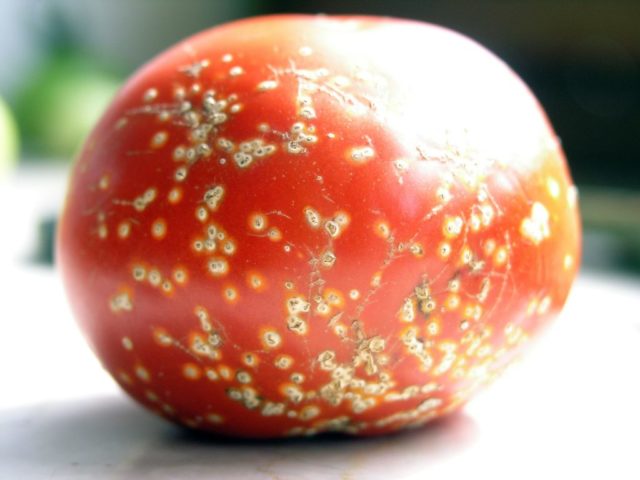
Decoctions of onion flakes help prevent bacterial cancer in poor soils
Fighting cancer is best done prophylactically. If the soil on the site is poor, and the plantings are often sick, they should be sprayed with onion fertilizers at intervals of 14 days from the end of flowering to fruiting.
Downy mildew
The disease, which leaves a whitish bloom on the tops, especially often affects cucumbers and tomatoes in August. To prevent the disease, weekly spraying of plantings with onion infusion is carried out. If the disease has already appeared, then you can use a concentrated decoction.
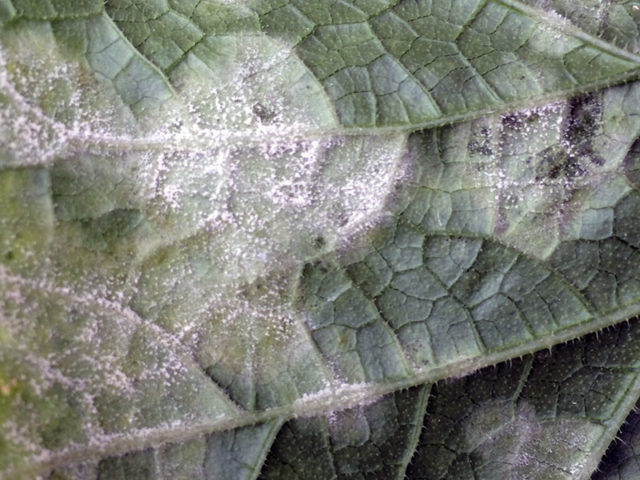
Fertilizers based on onion scales protect plantings from downy mildew
Against spider mites and thrips
Phytoncides in onion peels help to get rid of thrips on vegetable crops and from spider mites. Spraying is carried out from the beginning to the end of summer every week, you can use any infusion or decoction. When processing, it is important to ensure that the product falls, including on the underside of the leaves, where pests usually hide.
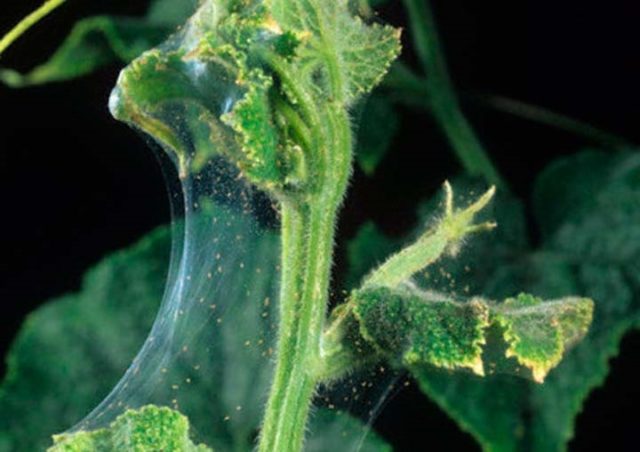
Infusion of onion scales helps to get rid of spider mites
How to use onion husks for storing root crops
Onion peelings release phytoncides that prevent decay and help preserve root crops for the winter. Vegetables must be placed in wide boxes and sprinkled with plenty of husks on each layer.
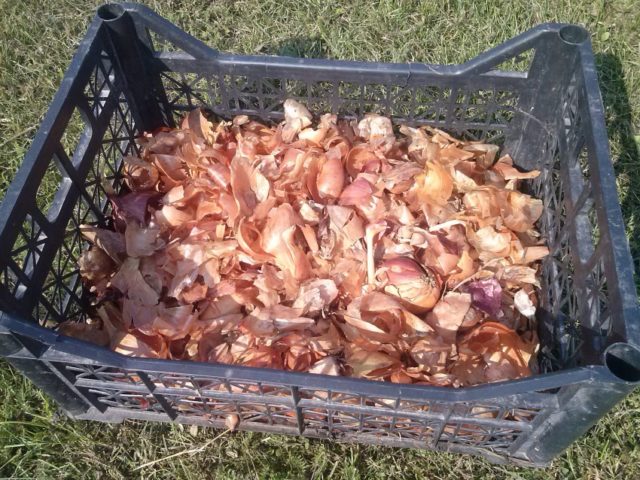
You can store potatoes, beets and carrots in the husk throughout the winter.
What plants can not be fed with onion peel
Any plants respond positively to nutrients in onion scales. Fertilizer is not recommended to be used only for domestic succulents - fat women, ficuses and cacti.
Storage rules for raw materials
When harvesting in autumn, onion skins are stored in a cool place with low humidity. From time to time, cleaning needs to be agitated so that mold does not appear in them.
As for finished fertilizers based on scales, they cannot be stored. You need to use them immediately, and make a fresh portion for the next processing.
Conclusion
Onion hulls are safe and very effective as a plant fertilizer. With its help, you can not only improve the composition of the soil, but also protect plantings from dangerous fungi and harmful insects.
